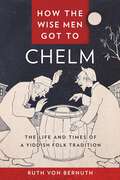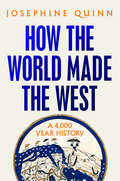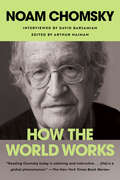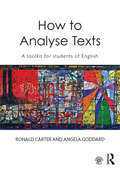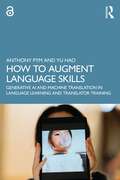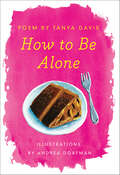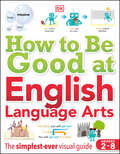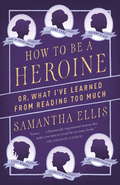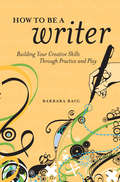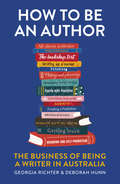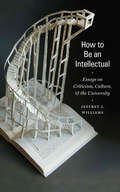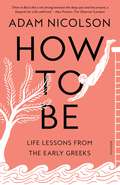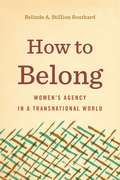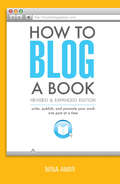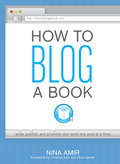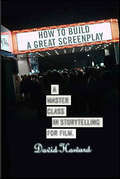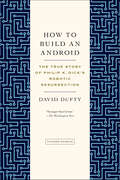- Table View
- List View
How the Wise Men Got to Chelm: The Life and Times of a Yiddish Folk Tradition (Families, Law, and Society)
by Ruth von BernuthHow the Wise Men Got to Chelm is the first in-depth study of Chelm literature and its relationship to its literary precursors. When God created the world, so it is said, he sent out an angel with a bag of foolish souls with instructions to distribute them equally all over the world—one fool per town. But the angel’s bag broke and all the souls spilled out onto the same spot. They built a settlement where they landed: the town is known as Chelm. The collected tales of these fools, or “wise men,” of Chelm constitute the best-known folktale tradition of the Jews of eastern Europe. This tradition includes a sprawling repertoire of stories about the alleged intellectual limitations of the members of this old and important Jewish community. Chelm did not make its debut in the role of the foolish shtetl par excellence until late in the nineteenth century. Since then, however, the town has led a double life—as a real city in eastern Poland and as an imaginary place onto which questions of Jewish identity, community, and history have been projected. By placing literary Chelm and its “foolish” antecedents in a broader historical context, it shows how they have functioned for over three hundred years as models of society, somewhere between utopia and dystopia. These imaginary foolish towns have enabled writers both to entertain and highlight a variety of societal problems, a function that literary Chelm continues to fulfill in Jewish literature to this day.
How the World Made the West: A 4,000 Year History
by Josephine QuinnAn award-winning Oxford history professor &“makes a forceful argument and tells a story with great verve&” (The Wall Street Journal)—that the West is, and always has been, truly global.&“Those archaic &‘Western Civ&’ classes so many of us took in college should be updated, argues Quinn, [who] invites us to . . . revel in a richer, more polyglot inheritance.&”—The Boston GlobeAN ECONOMIST BEST BOOK OF THE YEARIn How the World Made the West, Josephine Quinn poses perhaps the most significant challenge ever to the &“civilizational thinking&” regarding the origins of Western culture—that is, the idea that civilizations arose separately and distinctly from one another. Rather, she locates the roots of the modern West in everything from the law codes of Babylon, Assyrian irrigation, and the Phoenician art of sail to Indian literature, Arabic scholarship, and the metalworking riders of the Steppe, to name just a few examples.According to Quinn, reducing the backstory of the modern West to a narrative that focuses on Greece and Rome impoverishes our view of the past. This understanding of history would have made no sense to the ancient Greeks and Romans themselves, who understood and discussed their own connections to and borrowings from others. They consistently presented their own culture as the result of contact and exchange. Quinn builds on the writings they left behind with rich analyses of other ancient literary sources like the epic of Gilgamesh, holy texts, and newly discovered records revealing details of everyday life. A work of breathtaking scholarship, How the World Made the West also draws on the material culture of the times in art and artifacts as well as findings from the latest scientific advances in carbon dating and human genetics to thoroughly debunk the myth of the modern West as a self-made miracle.In lively prose and with bracing clarity, as well as through vivid maps and color illustrations, How the World Made the West challenges the stories the West continues to tell about itself. It redefines our understanding of the Western self and civilization in the cosmopolitan world of today.
How the World Works (Real Story Ser.)
by Noam ChomskyAn eye-opening introduction to the timelessly relevant ideas of Noam Chomsky, this book is a penetrating, illusion-shattering look at how things really work"Arguably the most important intellectual alive." —The New York TimesOffering something not found anywhere else, How the World Works is pure Chomsky, but tailored for those who are new to his work. The book is made up of meticulously edited speeches and interviews, and every dazzling idea and penetrating insight is kept intact and delivered in clear, accessible, reader-friendly prose.Originally published as a series of short works—What Uncle Sam Really Wants; The Prosperous Few and the Restless Many; Secrets, Lies and Democracy; and The Common Good—these volumes together sold nearly 600,000 copies. Now collected into one comprehensive anthology, How the World Works reveals how Chomsky&’s then-revolutionary ideas have only become more relevant as time has gone by.From the concept that extreme wealth and democracy cannot exist side-by-side; to how the assumptions of mainstream media purposefully limit the spectrum of acceptable opinion; to the decline of unions and workers&’ rights thanks to corporations and their unconstrained quest for profit, Chomsky&’s prescient theories of the future—not only the future of the United States, but of the world—make it very clear that our society is paying the price now for not heeding him then.
How to Analyse Texts: A toolkit for students of English
by Angela Goddard Ronald CarterHow to Analyse Texts is the essential introductory textbook and toolkit for language analysis. This book shows the reader how to undertake detailed, language-focussed, contextually sensitive analyses of a wide range of texts - spoken, written and multimodal. The book constitutes a flexible resource which can be used in different ways across a range of courses and at different levels. This textbook includes: three parts covering research and study skills, language structure and use, and how texts operate in sociocultural contexts a wide range of international real-life texts, including items from South China Morning Post, art'otel Berlin and Metro Sweden, which cover digital and print media, advertising, recipes and much more objectives and skill review for each section, activities, commentaries, suggestions for independent assignments, and an analysis checklist for students to follow a combined glossary and index and a comprehensive further reading section a companion website at www.routledge.com/cw/goddard with further links and exercises for students. Written by two experienced teachers of English Language, How to Analyse Texts is key reading for all students of English language and linguistics.
How to Argue and Win Every Time: At Home, at Work, in Court, Everywhere, Every Day
by Gerry SpenceThe Laws of Arguing According to Gerry Spence. Everyone is capable of making the winning argument. Winning is getting what we want, which also means helping "others" get what they want. Learn that words are a weapon, and can be used hostilely in combat.
How to Argue with a Cat: A Human's Guide to the Art of Persuasion
by Jay Heinrichs Natalie Palmer-SuttonLearn how to persuade cats—the world’s most skeptical and cautious negotiators—with this primer on rhetoric and argument from the New York Times bestselling author of Thank You for Arguing!Cats are skilled manipulators who can talk you into just about anything without a single word (or maybe a meow or two). They can get you to drop whatever you’re doing and play with them. They can make you serve their dinner way ahead of schedule. They can get you to sit down in an instant to provide a lap. On the other hand, try getting a cat to do what you want....While it’s hard, persuading a cat is possible. And after that, persuading humans becomes a breeze, and that is what you will learn in this book. How to Argue with a Cat will teach you how to:· Hold an intelligent conversation—one of the few things easier to do with a cat than a human.· Argue logically, even if your opponent is furry and irrational.· Hack up a fallacy (the hairball of logic).· Make your body do the talking (cats are very good at this).· Master decorum: the art of fitting in with cats, venture capitalists, or humans.· Learn the wisdom of predator timing to pounce at the right moment.· Get someone to do something or stop doing it.· Earn any creature’s respect and loyalty.
How to Augment Language Skills: Generative AI and Machine Translation in Language Learning and Translator Training
by Anthony Pym Yu HaoHow to Augment Language Skills outlines ways in which translators and language providers can expand their skillset and how translation technologies can be integrated into language learning and translator training.This book explains the basics of generative AI, machine translation, and translation memory suites, placing them in a historical context and assessing their fundamental impacts on language skills. It covers what to teach in a specific context, how to teach it, how to assess the result, and how to set up lively class discussions on the many problematic aspects. The exploratory empirical approach is designed to reach across several divides: between language education and translation studies, between technology designers and users, between Western and Asian research, and between abstract ideas and hands-on practice.Features include: Fifty-seven technology-related activities for the language and/or translation class. Recent research on the capacities of generative AI. Examples of how to conduct a needs analysis in the Higher Education context. Comparisons of the main teaching methods. Ways to assess the use of technologies. Examples in Chinese, Spanish, Catalan, French, and German. A full glossary explaining the key terms in clear language. Drawing on years of classroom experience, Pym and Hao illustrate how these skills can be taught in a range of classroom and online activities, making this essential reading for teachers and researchers involved in the teaching of languages and the training of translators.
How to Be Alone
by Tanya DavisSince its debut on YouTube, Tanya Davis’s beautiful and perceptive poem "How to Be Alone," visually realized by artist and filmmaker Andrea Dorfman, has become an international sensation. In this edition of How to Be Alone, they have adapted the poem and its compelling illustrations for the page in a beautiful, meditative volume—a keepsake to treasure and to share. From a solitary walk in the woods to sitting unaccompanied on a city park bench to eating a meal and even dancing alone, How to Be Alone, reveals the possibilities and joys waiting to be discovered when we engage in activities on our own. As she soothes the disquietude that accompanies the fear of aloneness, and celebrates the power of solitude to change how we see ourselves and the world, Tanya reveals how, removed from the noise and distractions of other lives, we can find acceptance and grace within.For those who have never been by themselves or those who embrace being on their own, How to Be Alone encourages us to recognize and embrace the possibilities of being alone—and reminds us of a universe of joy, peace, and discovery waiting to unfold.
How to Be Disabled in a Pandemic
by Mara Mills, et al.,A chronicle of ableism and disability activism in New York City during the COVID-19 pandemicHow to Be Disabled in a Pandemic documents the pivotal experiences of disabled people living in an early epicenter of COVID-19: New York City. Among those hardest hit by the pandemic, disability communities across the five boroughs have been disproportionately impacted by city and national policies, work and housing conditions, stigma, racism, and violence—as much as by the virus itself. Disabled and chronically-ill activists have protested plans for medical rationing and refuted the eugenic logic of mainstream politicians and journalists who “reassure” audiences that only older people and those with disabilities continue to die from COVID-19. At the same time, as exemplified by the viral hashtag #DisabledPeopleToldYou, disability expertise has become widely recognized in practices such as accessible remote work and education, quarantine, and distributed networks of support and mutual aid. This edited volume charts the legacies of this “mass disabling event” for uncertain viral futures, exploring the dialectic between disproportionate risk and the creativity of a disability justice response.How to Be Disabled in a Pandemic includes contributions by wide-ranging disability scholars, writers, and activists whose research and lived experiences chronicle the pandemic’s impacts in prisons, migrant detention centers, Chinatown senior centers, hospitals in Queens and the Bronx, subways, schools, housing shelters, social media, and other locations of public and private life. By focusing on New York City over the course of three years, the book reveals key themes of the pandemic, including hierarchies of disability "vulnerability," the deployment of disability as a tool of population management, and innovative crip pandemic cultural production. How to Be Disabled in a Pandemic honors those lost, as well as those who survived, by calling for just policies and caring infrastructures, not only in times of crisis but for the long haul.
How to Be Good at English Language Arts: The Simplest-ever Visual Guide (DK How to Be Good at)
by DKIdeal for home learning, this simple and inspirational book has everything you need to get to grips with grammar and punctuation, and master essential reading and writing skills.Need help telling your adjectives from your adverbs? Struggling to work out what that poem is really about, or where to begin with your essay? Then this may be the book for you! How to be Good at English Language Arts uses short, straightforward explanations and clear graphics to shed light on the trickiest of topics, making this language-learning book the perfect guide to understanding and using the English language.Illustrated examples make daunting grammar accessible and fun, and help develop an understanding that can be applied to school studies. Annotated texts complement concise, practical guidance to support students in developing sound analytical and writing skills. The carefully selected reading recommendations will inspire reading for pleasure, while clear links between topics will ensure that students not only understand language techniques but know how to apply them effectively.Dive into the pages of this great grammar guide for kids to discover: -Visual explanations make concepts easy to grasp at first glance-Every topic is broken down into short sections of text written in simple language-Annotated texts provide students with clear guidance on identifying and applying language techniques effectively-&“Further reading&” features encourage reading for pleasure-&“World of words&” features bring English to life, connecting language on the page with language in the real world How to be Good at English Language Arts will inspire students to uncover and enjoy the art and power of language, supporting them on their way to becoming confident and accomplished readers, writers, and speakers. The highly visual approach alongside clear, short explanations breaks down the language and makes the subject easy to understand, whilst also supporting education curricula around the world for children aged 9-12; it is also suitable for foreign students studying English language and literature, and an ideal resource for children studying at home.
How to Be a Heroine
by Samantha EllisWhile debating literature's greatest heroines with her best friend, thirtysomething playwright Samantha Ellis has a revelation--her whole life, she's been trying to be Cathy Earnshaw of Wuthering Heights when she should have been trying to be Jane Eyre. With this discovery, she embarks on a retrospective look at the literary ladies--the characters and the writers--whom she has loved since childhood. From early obsessions with the March sisters to her later idolization of Sylvia Plath, Ellis evaluates how her heroines stack up today. And, just as she excavates the stories of her favorite characters, Ellis also shares a frank, often humorous account of her own life growing up in a tight-knit Iraqi Jewish community in London. Here a life-long reader explores how heroines shape all our lives.From the Trade Paperback edition.
How to Be a Writer: Building Your Creative Skills Through Practice and Play
by Barbara BaigAthletes practice. Musicians practice. As a writer you need to do the same. Whether you have dreams of writing a novel or a memoir or a collection of poems, or you simply want to improve your everyday writing, this innovative book will show you how to build your skills by way of practice. Through playful and purposeful exercises, you'll develop your natural aptitude for communication, strengthening your ability to come up with things to say, and your ability to get those things into the minds (and the hearts) of readers. You'll learn to: Train and develop your writer's powers-creativity, memory, observation, imagination, curiosity, and the subconscious Understand the true nature of the relationship between you and your readers Find your writer's voice Get required writing projects done so you have more time for the writing youwantto do And much more Empowering and down-to-earth, How to Be a Writer gives you the tools you need, and tells you what (and how) to practice so that you can become the writer you want to be.
How to Be an Author: The Business of Being a Writer in Australia
by Georgia Richter Deborah HunnIf you dream of being published, this book will teach you the nuts and bolts of what it means to be an author. In a friendly, informative and practical way, Georgia Richter and Deborah Hunn share all you need to know about inspiration and research, preparing to submit to a publisher, creating an author brand, legal, ethical and moral considerations, pitching, effective social media and much more. Practical advice and top tips from Liz Byrski, Alan Carter, Nandi Chinna, Tim Coronel, Amanda Curtin, Daniel de Lorne, Deb Fitzpatrick, James Foley, Alecia Hancock, Stephen Kinnane, Ambelin Kwaymullina, Natasha Lester, Brigid Lowry, Caitlin Maling, Meg McKinlay, Claire Miller, Brendan Ritchie, Rachel Robertson, Holden Sheppard, Sasha Wasley, David Whish-Wilson and Anne-Louise Willoughby.
How to Be an Intellectual: Essays on Criticism, Culture, and the University
by Jeffrey J. WilliamsOver the past decade, Jeffrey J. Williams has been one of the most perceptive observers of contemporary literary and cultural studies. He has also been a shrewd analyst of the state of American higher education. How to Be an Intellectual brings together noted and new essays and exemplifies Williams’s effort to bring criticism to a wider publicHow to Be an Intellectual profiles a number of critics, drawing on a unique series of interviews that give an inside look at their work and careers. The book often looks at critical thought from surprising angles, examining, for instance, the history of modern American criticism in terms of its keywords as they morphed from sound to rigorous to smart. It also puts in plain language the political travesty of higher education policies that produce student debt, which, as Williams demonstrates, all too readily follow the model of colonial indenture, not just as a metaphor but in actual point of fact.How to Be an Intellectual tells a story of intellectual life since the culture wars. Shedding academic obscurity and calling for a better critical writing, it reflects on what makes the critic and intellectual—the accidents of careers, the trends in thought, the institutions that shape us, and politics. It also includes personal views of living and working with books.
How to Be: Life Lessons from the Early Greeks
by Adam NicolsonNicolson crafts a geography of the ancient world and a brilliant exploration of our connections to the past.What is the nature of things?What is justice? How can I be myself?How should we treat each other?Before the Greeks, the idea of the world was dominated by god-kings and their priests. Twenty-five hundred years ago, in a succession of small eastern Mediterranean harbor cities, a few heroic men and women decided to cast off mental subservience and apply their own thinking minds to the conundrums of life.These great innovators shaped the beginnings of western philosophy. Through the questioning voyager Odysseus, Homer explored how we might navigate our way through the world. Heraclitus, in Ephesus, was the first to consider the interrelatedness of things. Xenophanes of Colophon was the first champion of civility. On the Aegean island of Lesbos, the early lyric poets Sappho and Alcaeus asked themselves, “How can I be true to myself?” On Samos, Pythagoras imagined an everlasting soul and took his ideas to Italy, where they flowered again in surprising and radical forms.The award-winning writer Adam Nicolson travels with us through this transforming world and asks what light these ancient thinkers can throw on our deepest preconceptions. Enhanced with maps, photographs, and artwork, How to Be is an expedition into early ideas. Nicolson takes us to the dawn of investigative thought and makes the fundamental questions of the ancient philosophers new again. What are the principles of the physical world? How can we be good in it? And why do we continue to ask these questions? It is an enthralling, exhilarating journey.
How to Become a Famous Writer Before You're Dead
by Ariel GoreThis may come as a shock, but brilliant writing and clever wordplay do not a published author make. True, you'll actually have to write if you want to be a writer, but ultimately literary success is about much more than putting pen to paper (or fingers to keys). Before you snap your pencil in half with frustration, please consider the advice writer, teacher, and self-made lit star Ariel Gore offers in this useful guide to realizing your literary dreams. If you find yourself writing when you should be sleeping and scribbling notes on odd pieces of paper at every stoplight, you might as well enjoy the fruits of your labor. How to Become a Famous Writer Before You're Deadis an irreverent yet practical guide that combines solid writing advice with guerrilla marketing and promotion techniques guaranteed to launch you into print--and into the limelight. You'll learn how to: * Reimagine yourself as a buzz-worthy artist and entrepreneur * Get your work and your name out in the world where other people can read it * Be an anthology slut and a brazen self-promoter * Apply real-world advice and experience from lit stars like Dave Barry, Susie Bright, and Dave Eggers to your own career Cheaper than an M. F. A. but just as informative,How to Become a Famous Writer Before You're Deadis your catapult to lit stardom. Just don't forget to thank Ariel Gore for her inspiring, hands-on plan in the acknowledgments page of your first novel!
How to Behave Badly in Elizabethan England: A Guide For Knaves, Fools, Harlots, Cuckolds, Drunkards, Liars, Thieves, And Braggarts
by Ruth GoodmanOffensive language, insolent behavior, slights, brawls, and scandals come alive in Ruth Goodman’s uproarious history. Every age and social strata has its bad eggs, rule-breakers, and nose-thumbers. As acclaimed popular historian and author of How to Be a Victorian Ruth Goodman shows in her madcap chronicle, Elizabethan England was particularly rank with troublemakers, from snooty needlers who took aim with a cutting “thee,” to lowbrow drunkards with revolting table manners. Goodman draws on advice manuals, court cases, and sermons to offer this colorfully crude portrait of offenses most foul. Mischievous readers will delight in learning how to time your impressions for the biggest laugh, why quoting Shakespeare was poor form, and why curses hurled at women were almost always about sex (and why we shouldn’t be surprised). Bringing her signature “exhilarating and contagious” enthusiasm (Boston Globe), this is a celebration of one of history’s naughtiest periods, when derision was an art form.
How to Belong: Women’s Agency in a Transnational World (Rhetoric and Democratic Deliberation #18)
by Belinda A. Stillion SouthardIn How to Belong, Belinda Stillion Southard examines how women leaders throughout the world have asserted their rhetorical agency in troubling economic, social, and political conditions. Rather than utilizing the concept of citizenship to bolster political influence, the women in the case studies presented here rely on the power of relationships to create a more habitable world.With the rise of global capitalism, many nation-states that have profited from invigorated flows of capital have also responded to the threat of increased human mobility by heightening national citizenship’s exclusionary power. Through a series of case studies that include women grassroots protesters, a woman president, and a woman United Nations director, Stillion Southard analyzes several examples of women, all as embodied subjects in a particular transnational context, pushing back against this often violent rise in nationalist rhetoric. While scholars have typically used the concept of citizenship to explain what it means to belong, Stillion Southard instead shows how these women have reimagined belonging in ways that have enabled them to create national, regional, and global communities.As part of a broader conversation centered on exposing the violence of national citizenship and proposing ways of rejecting that violence, this book seeks to provide answers through the powerful rhetorical practices of resilient and inspiring women who have successfully negotiated what it means to belong, to be included, and to enact change beyond the boundaries of citizenship.
How to Belong: Women’s Agency in a Transnational World (Rhetoric and Democratic Deliberation #18)
by Belinda A. Stillion SouthardIn How to Belong, Belinda Stillion Southard examines how women leaders throughout the world have asserted their rhetorical agency in troubling economic, social, and political conditions. Rather than utilizing the concept of citizenship to bolster political influence, the women in the case studies presented here rely on the power of relationships to create a more habitable world.With the rise of global capitalism, many nation-states that have profited from invigorated flows of capital have also responded to the threat of increased human mobility by heightening national citizenship’s exclusionary power. Through a series of case studies that include women grassroots protesters, a woman president, and a woman United Nations director, Stillion Southard analyzes several examples of women, all as embodied subjects in a particular transnational context, pushing back against this often violent rise in nationalist rhetoric. While scholars have typically used the concept of citizenship to explain what it means to belong, Stillion Southard instead shows how these women have reimagined belonging in ways that have enabled them to create national, regional, and global communities.As part of a broader conversation centered on exposing the violence of national citizenship and proposing ways of rejecting that violence, this book seeks to provide answers through the powerful rhetorical practices of resilient and inspiring women who have successfully negotiated what it means to belong, to be included, and to enact change beyond the boundaries of citizenship.
How to Blog a Book Revised and Expanded Edition: Write, Publish, and Promote Your Work One Post at a Time
by Nina AmirHow to Blog a Book, Revised and Expanded Edition shows you how to plan a successful book that you can then blog into existence while building your platform and attracting potential publishers. Aspiring authors learn how to create a blogged book with a well-honed and uniquely angled subject, targeted posts, and a readership large enough to get noticed by an agent or a publisher.
How to Blog a Book: Write, Publish, and Promote Your Work One Post at a Time
by Nina AmirBlogging is one of quickest and most effective ways to amass a body of work and build your platform. But how do you hone your blog content into a uniquely positioned book that will be noticed by an agent or a publisher?
How to Boost Reading and Writing Through Play: Fun Literacy-Based Activities for Children
by Georgina DurrantEven if children know their phonics and ABC's inside out and can read every book in their book bag, why is it still so difficult to get them to want to read and write? How do we begin to get our children excited about literacy? The answer might surprise you...let them play!Featuring 40 engaging play-based activities, this book makes literacy so fun that children won't notice they're also actively developing reading and writing skills. From blow painting words to making paper chain sentences, each activity can be done using household items and they are adaptable for children of any age and ability, making learning accessible for all. With charming black and white line illustrations to depict each activity, this is a great way to connect with children while helping to build their literacy skills at the same time.
How to Build a Great Screenplay: A Master Class in Storytelling for Film
by David HowardHow to Bulid a Great Screenplay is a definitive guide on the mechanics of screenwriting--filled with examples--from the author of The Tools of Screenwriting. Acclaimed USC screenwriting teacher David Howard has guided hundreds of students to careers in writing for film and television. Drawing on decades of practical experience and savvy, How to Build a Great Screenplay deconstructs the craft of screenwriting and carefully reveals how to build a good story from the ground up. Howard eschews the "system" offered by other books, emphasizing that a great screenplay requires dozens of unique decisions by the author. He offers in-depth considerations of:* characterization * story arc * plotting and subplotting * dealing with coincidence in story plotting* classical vs. revolutionary screenplay structure * tone, style, and atmosphere * the use of time on screen* the creation of drama and tension * crucial moments in storytellingThroughout the book, Howard clarifies his lessons through examples from some of the most successful Hollywood and international script-oriented films, including Pulp Fiction, American Beauty, Trainspotting, North by Northwest, Chinatown, and others. The end result is what could very well become the classic text in the field---a bible for the burgeoning screenwriter.
How to Build a Story . . . Or, the Big What If
by Frances O'Roark DowellFrom bestselling author Frances O&’Roark Dowell comes a fresh and accessible guide to storytelling that breaks down the sometimes-daunting writing process into straightforward, doable steps, just right for budding writers!If you&’ve written anything, ever, you&’re already a writer—so, congratulations! As many aspiring authors know, though, telling an actual, complete story is, well, a different story. As unfinished drafts pile up and writers&’ block strikes, it may start to feel like there&’s a special formula to finishing a project that you&’re just not getting. But crafting a story isn&’t magic, if you have a little know-how! And here it is—know-how! In her witty, clever way, critically acclaimed author Frances O&’Roark Dowell explains the storytelling process with simple, easy-to-understand steps. Follow along as she shares sample stories and identifies building blocks and obstacles to conquer—all hilariously illustrated, in a way that&’ll have you typing all the way to the end of your own story. In addition to writing many books including Shooting the Moon and Dovey Coe, Frances O&’Roark Dowell has over a decade&’s experience teaching writing workshops for kids. Ready, set, write!
How to Build an Android: The True Story of Philip K. Dick's Robotic Resurrection
by David DuftyThe stranger-than-fiction story of the ingenious creation and loss of an artificially intelligent android of science-fiction writer Philip K. DickIn late January 2006, a young robotocist on the way to Google headquarters lost an overnight bag on a flight somewhere between Dallas and Las Vegas. In it was a fully functional head of the android replica of Philip K. Dick, cult science-fiction writer and counterculture guru. It has never been recovered. In a story that echoes some of the most paranoid fantasies of a Dick novel, readers get a fascinating inside look at the scientists and technology that made this amazing android possible. The author, who was a fellow researcher at the University of Memphis Institute of Intelligent Systems while the android was being built, introduces readers to the cutting-edge technology in robotics, artificial intelligence, and sculpture that came together in this remarkable machine and captured the imagination of scientists, artists, and science-fiction fans alike. And there are great stories about Dick himself—his inspired yet deeply pessimistic worldview, his bizarre lifestyle, and his enduring creative legacy. In the tradition of popular science classics like Packing for Mars and The Disappearing Spoon, How to Build an Android is entertaining and informative—popular science at its best.
